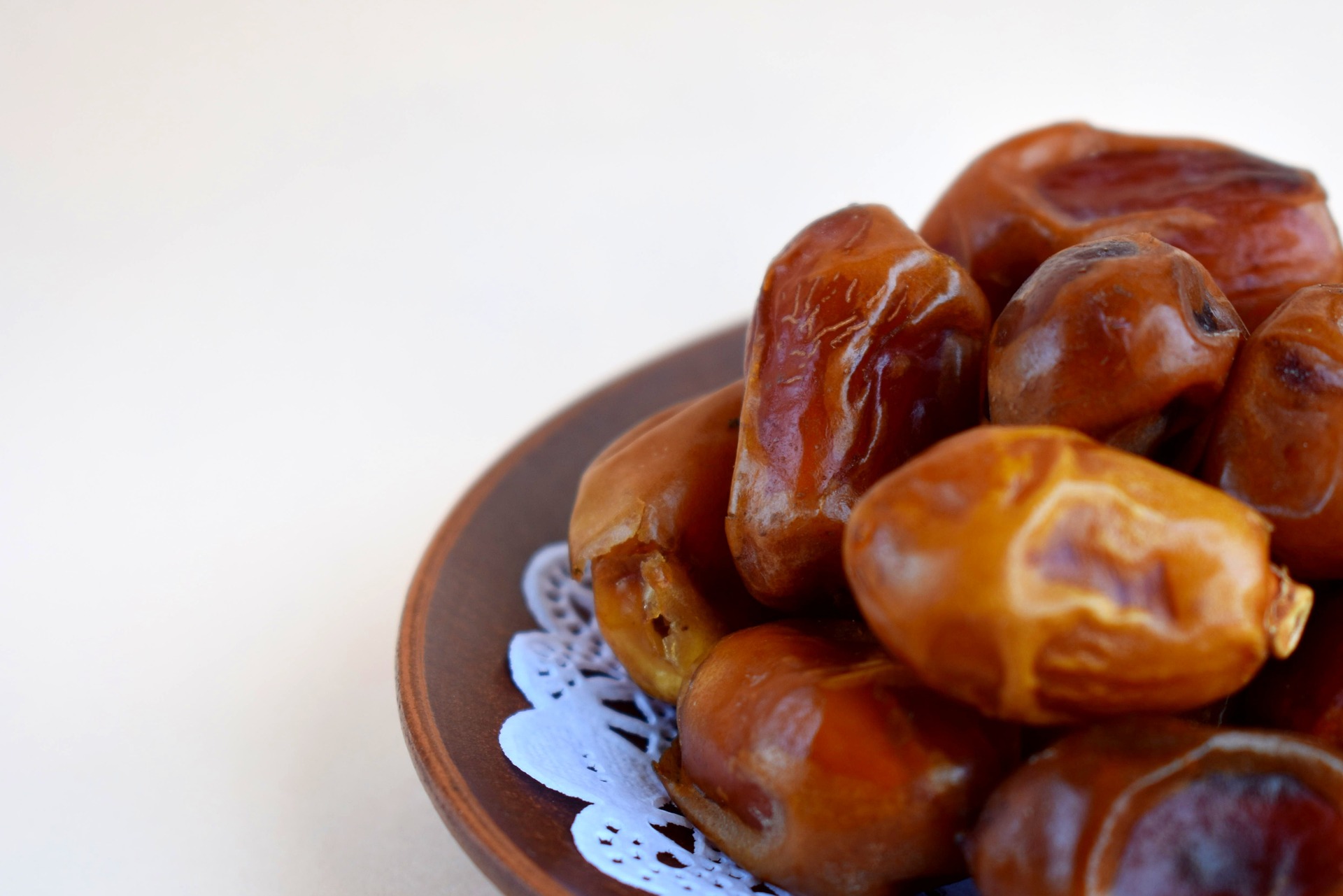Foods That Induce Labor: Do These Natural Strategies Really Work?
If there is anything I desire most in this pregnancy - besides a healthy baby - it is an easy, quick, and relatively pain-free labor. I imagine that most other mommas-to-be wish for the same.
So when my doctor advised me that if I want an “easier” labor that I should take walks regularly, have date nights with my husband, and do squats and lunges often, you better believe I’m going to make that happen!
But the dietitian in me wonders: what about food and nutrition? Do any nutritional strategies or foods help promote a quick and easy labor and delivery?
Throughout pregnancy, I’ve heard stories from family, friends, and those on social media about drinking red raspberry leaf tea to stimulate uterine contractions, to eat dates to enhance the speed of labor and delivery, and to choose foods like pineapple or spicy food to get baby to make it’s way out easier.
So are any of those claims valid? Can red raspberry leaf tea and eating dates daily really help labor and delivery? Do pineapple and spicy foods help induce labor? Or are those claims purely an addition to the copious amount of old wives tales that surround pregnancy?
I decided to dig into the research to find out. Here’s what I discovered about each of the foods that are purported to induce labor and what my plans are for including them (or not!) in my last few weeks of pregnancy.
Red Raspberry Leaf For Labor:
The claims on red raspberry leaf for labor & delivery:
Red raspberry leaf is just as the name implies…the leaves of the red raspberry plant! Drinking red raspberry leaf tea is purported to help tone the muscles of the uterus and the pelvic area to prepare a woman’s body for childbirth.
The science on red raspberry leaf for labor & delivery:
Drinking red raspberry leaf (Rubus idaeus) tea appears to be safe during pregnancy for both mom and baby.
However, a 2001 randomized, double-blind, placebo-controlled trial published in the Journal of Midwifery & Women’s Health demonstrated that while it may be safe, drinking red raspberry leaf tea may not be effective. In the study involving 192 low-risk, pregnant women, two 1.2 gram tablets of red raspberry leaf were given to the intervention group each day from 32 weeks gestation until labor. Compared to the control group, the intervention group did not see any shortening of the first stage of labor. Despite this, there was a significant difference noted among the women in the second stage of labor — those who had received the red raspberry leaf tea had a shortened duration of the second stage of labor by 9.59 minutes! Too, those in the intervention group demonstrated a lower rate of forceps deliveries (19.3%) compared to the control group (30.4%). In the end, the authors of this study concluded that more high quality studies are needed to determine the effects of red raspberry leaf during pregnancy. (1)
The same sentiment is echoed in a 2009 review by Holst et. al in the Complementary Therapies in Clinical Practice journal. These authors write, “the efficacy of raspberry leaf is not convincingly documented.” (2)
There are some animal studies evaluating the efficacy of red raspberry leaf tea on uterine contractions - in these, both red raspberry leaf tea and capsules were not supportive of the claims that red raspberry leaf directly impacts uterine contractions. (3)
Interestingly, a case study published in 2016 in the Journal of Obstetrics & Gynecology shares the story of a woman with gestational diabetes who developed hypoglycemia (low blood sugar) after drinking red raspberry leaf tea - and because of this, her insulin requirements needed to be reduced. Even though this is a case study with just one person, it’s important to point out that herbal/natural solutions may have other effects on the body other than what they’re “intended" to do. This story elucidates the need for close monitoring by your physician/healthcare team while pregnant - and also that further research is needed to not only understand red raspberry leaf’s effects on labor and delivery but in other measures of health during pregnancy, too. (4)
the bottom line & my pregnancy plan for using red raspberry leaf tea:
The current research related to the efficacy of red raspberry leaf tea demonstrates that this herbal, natural supplement may not do the work that it’s currently claimed to do! But, drinking it appears to be safe.
I’ve found a tea with red raspberry leaf that I really like (this one!), so despite the lack of strong evidence, I’ll keep drinking it. I find that drinking red raspberry leaf tea in the evenings helps me wind down and relax, and I think that’s important in these final weeks of pregnancy, too. And, if red raspberry leaf tea does indeed help shorten the second stage of labor by just 10 minutes (and reduce the incidence of forceps deliveries - whose rate has declined over the years anyway!), I believe that drinking it will be worth it. But since the science isn’t super strong, if by chance I don’t have the opportunity to sip it each day, I’m not going to fret!
Eating Dates For Labor:
The claims on eating dates for a faster labor & Delivery:
Users of online message boards say that eating dates in the final weeks of pregnancy can “shorten” or “speed up” labor and delivery.
The science on eating dates for a faster labor & Delivery:
A 2011 study published in the Journal of Obstetrics and Gynecology demonstrated that women who ate 6 dates per day for 4 weeks prior to their due date had a greater rate of spontaneous labor, were more dilated upon hospital admission, experienced a shorter duration of the first stage of labor, and required the use of prostin/oxytocin significantly less than those who did not eat dates. (5)
Similar outcomes were seen in a randomized controlled trial published in 2017 in the Journal of Obstetrics and Gynecology, which demonstrated that women who ate dates during late pregnancy needed to augment labor with oxytocin significantly less often than women who didn’t eat dates. (6)
Again, dates were shown to deliver beneficial outcomes for labor and delivery in a 2017 study published in the Iranian Journal of Nursing and Midwifery Research. In this study, 182 women were randomized to an intervention group, who received 70-75 grams of dates (6-7 dates) everyday in their 37th week of pregnancy and beyond, and a control group, who was instructed not to eat any dates in their final weeks of pregnancy. The study demonstrated that those who consumed dates experienced significantly shorter first, second, and third stages of labor compared to those who did not eat dates. Plus, those who ate dates experienced significantly more spontaneous labors (instead of induced labors) and less augmented labors (less use of oxytocin to speed up labor). (7)
So how exactly do dates work to speed up labor? Researchers point to many theories, like that perhaps the simple sugars in dates allow for more energy availability for the mom during labor, that maybe the tannins in dates allow for more effective cervical contractions, or that maybe dates help increase the amount of oxytocin receptors developed in late pregnancy which in turn would make the uterine muscles more effective at responding to oxytocin during labor and delivery. (5-7)
The bottom line & my pregnancy plan for eating dates:
The available evidence, though limited, shows some promising outcomes with respect to eating dates during pregnancy.
It’s interesting to note that in one study, 70-75 grams of Mazafati dates (about 6-7 dates) were eaten by the women. There are many different types of dates, and the ones I most commonly find at the grocery store here in the United States are Medjool dates. Because Medjool dates are larger than Mazafati dates, about 3 Medjool dates are equivalent to 70 grams so you may not necessarily have to eat 6-7 dates per day to see the potential benefit! Yet, it’s important to realize that there may be slight differences in growing conditions between various date varieties, which could lead to a differing nutritional content between the two cultivars of dates - and that might mean that Medjool dates would interact differently in the body and show different research outcomes when compared to the Mazafati dates. We just don’t quite know yet.
In the meantime, I enjoy eating dates — and I believe that if by chance they can promote a shortened duration of labor and a reduced need for labor augmentation, I’m all in! I’ve been eating dates occasionally throughout pregnancy and will emphasize them in the final weeks of pregnancy, though again if I don’t eat them daily I won’t be worried. I’ll eat dates pitted & plain, layer over some peanut or almond butter and add a chocolate chip for a sweet treat, use them to make homemade energy bites or energy bars, or will add them to a smoothie or to oatmeal for added sweetness. You can also find dates as the base of some bars - like Larabar or RxBars.
Here are some of my favorite food and beverage choices from Amazon that include red raspberry leaf and dates*:
Eating Pineapple For Labor:
The claims on eating pineapple for labor & delivery:
Social media and online message boards share that pineapple might “soften the cervix,” thus helping “promote” labor. Folklore medicine, on the other hand, claims that pineapple has “abortifacient” properties (i.e. induces miscarriage)…yikes.
The science on eating pineapple for labor & delivery:
So first off, should I be worried about eating pineapple in pregnancy? According to a 2011 animal study, no, pineapple juice in early pregnancy did not exhibit abortion-inducing activity.(8) Eating pineapple or drinking pineapple juice in amounts commonly consumed is considered safe during pregnancy.(9) Folklore medicine isn’t always accurate!
That being said, even though it’s safe, it doesn’t mean that eating pineapple is the ticket to a fast labor. Turns out, he evidence we have on pineapple to “soften the cervix” and “induce contractions” is quite limited.
What we do know is that in two in-vitro (in a test tube) studies - which used both rat and human uterine muscles - some pineapple extracts stimulated uterine activity.(9, 10) Later studies demonstrated that the activity of those specific pineapple extracts is reliant upon the serotonin pathway. Because of this, researchers write that a serotonin-rich diet may also play a role in uterine motility. (11)
The bottom line & my pregnancy plan for eating pineapple:
While certain pineapple juice extracts may play a role in uterine activity in both rats and humans, the evidence just isn’t strong enough for me to recommend nor specifically seek out pineapple or pineapple juice for the sole purpose of promoting labor. However, eating pineapple appears to be safe during pregnancy.
In fact, we know that whether a person is pregnant or not, pineapple is a nutritious fruit. Just one cup delivers carbohydrates, over 100% of a person’s daily needs for vitamin C, plus some fiber, vitamin B6, and manganese, too! I’ll eat some fresh pineapple when it’s available, but I’m not going to stress if I don’t eat it daily or weekly.
Eating Spicy Food For Labor & Delivery:
The claims on spicy food for labor & Delivery:
Several women share stories online about how they ate a spicy meal at a Mexican, Indian, or Thai restaurant the night before they went into labor.
The science on spicy food for labor & Delivery:
While one study demonstrates that over 10% of women will eat spicy food to induce labor, there is relatively little science on whether or spicy food — like that from cayenne peppers, curry powder, or garlic — actually induces labor. (12).
The bottom line & my pregnancy plan for eating spicy food:
There’s a widespread lack of evidence that eating spicy food induces labor. And, keep in mind that if you struggle with heartburn during pregnancy, spicy food isn’t going to be much of a help for you there! (13)
Since I don’t struggle with heartburn during pregnancy, and since I enjoy spicy foods, I’ll include spicy food as part of my usual healthy eating routine - but I’m not going to go out of my way to make sure I have it a certain number of times per week or everyday after my due date. When spicy food is a fit, I’ll have it! When it’s not, I’ll pass.
I can’t help but wonder if perhaps all of the stories online about date night at a spicy food restaurant that resulted in labor later that evening actually have more to do with spending time with the person you love instead of the food the was eaten! We know that oxytocin (the “love hormone”) levels in the body rise whenever we bond with those we love. Oxytocin also increases the activity of the uterus. In fact, it’s actually given as a prescription drug (called Pitocin) to induce labor for some women! So I question: is it really the spicy food, or is it the date night, that led to labor for these ladies?
The Bottom Line on Foods to Induce Labor:
Whether you want to be relieved of some of the discomforts of late pregnancy, whether you want to get baby here quickly and easily, or whether you want to simply…finally!…hold your sweet little baby in your arms after nine months, it makes sense that many pregnant women (like myself!) will try almost anything they can to meet their baby sooner. And while drinking red raspberry leaf tea, eating dates, noshing on some pineapple, and eating spicy food are all safe practices during pregnancy, they may not live up to their overly-hyped claims. We simply need more evidence.
In the meantime, my best recommendations are to continue to enjoy a healthy eating pattern during the final weeks of pregnancy. This may include the above foods and beverages or not! You decide. And be sure to talk to your doctor about strategies that might work well for you to help you feel more comfortable and confident in the final weeks of pregnancy and in having a healthy delivery. You’ve got this, momma!
TELL ME: Have you heard about any other foods or beverages that can help speed up labor and help you manage an easier delivery? I want to hear about them! Leave me a comment to let me know.
References:
Simpson M, Parsons M, Greenwood J, Wade K. Raspberry leaf in pregnancy: its safety and efficacy in labor. J Midwifery Womens Health 2001;46:51-9.
Holst L. Haavik S, Nordeng H. Raspberry leaf - should it be recommended to pregnant women? Complement Ther Clin Pract. 2009 Nov;15(4):204-8. doi: 10.1016/j.ctcp.2009.05.003. Epub 2009 Jun 13.
Zheng J, Pistilli MJ, Holloway AC, Crankshaw DJ. The effects of commercial preparations of red raspberry leaf on the contractility of the rat’s uterus in vitro. Reprod Sci. 2010 May;17(5):494-501. doi: 10.1177/1933719109359703. Epub 2010 Mar 10.
Cheang KI, Nguyen TT, Karjane NW, Salley KE. Raspberry Leaf and Hypoglycemia in Gestational Diabetes Mellitus. Obstet Gynecol. 2016 Dec;128(6):1421-1424.
Al-Kuran O, Al-Mehaisen L, Bawadi H, Beitawi S, Amarin Z. The effect of late pregnancy consumption of date fruit on labour and delivery. J Obstet Gynaecol. 2011;31(1):29-31. doi: 10.3109/01443615.2010.522267.
Razali N, Mohd Nahwari SH, Sulaiman S, Hassan J. Date fruit consumption at term: Effect on length of gestation, labour and delivery. J Obstet Gynaecol. 2017 Jul;37(5):595-600. doi: 10.1080/01443615.2017.1283304. Epub 2017 Mar 13.
Kordi M, Meybodi FA, Tara F, Fakari FR, Nemati M, Shakeri M. Effect of Dates in Late Pregnancy on the Duration of Labor in Nulliparous Women. Iran J Nurs Midwifery Res. 2017;22(5):383-387.
Yakubu MT, Olawepo OJ, Fasoranti GI. Ananas comosus: is the unripe fruit juice an abortifacient in pregnant Wistar rats? Eur J Contracept Reprod Health Care. 2011 Oct;16(5):397-402. doi: 10.3109/13625187.2011.599454. Epub 2011 Aug 10.
Monji F, Adaikan PG, Lau LC, Bin Said B, Gong Y, Tan HM, Choolani M. Investigation of uterotonic properties of Ananas comosus extracts. J Enthopharmacol. 2016 Dec 4;193:21-29. doi: 10.1016/j.jep.2016.07.041. Epub 2016 Jul 16.
Nwankudu NO, Ndibe NU, Ijioma SN. Oxytocic Effect of Ananas Comosus Fruit Juice on Isolated Pregnant Rats Uteri. Nigerian Veterinary Journal. December 2015 Vol. 36 (4): 1318-1326. https://www.ajol.info/index.php/nvj/article/viewFile/147327/136833.
Monji F, Adaikan PG, Lau LC, Siddiquee AA, Said BB, Yang LK, K Y, Choolani MA. Role of the serotonergic pathway in uterotonic activity of Ananas comosus (L.) Merr. - An in vitro and in vivo study. Phytomedicine. 2018 Sep 15;48:32-42. doi: 10.1016/j.phymed.2018.05.004. Epub 2018 May 8.
Chaudhry Z, Fischer J, Schaffir J. Women's use of nonprescribed methods to induce labor: a brief report. Birth. 2011 Jun;38(2):168-71. doi: 10.1111/j.1523-536X.2010.00465.x. Epub 2011 Mar 10.
Ramya RS, Jayanthi N, Alexander PC, Vijaya S, Jayanthi V. Gastroesophageal reflux disease in pregnancy: a longitudinal study. Trop Gastroenterol. 2014 Jul-Sep;35(3):168-72.
*Amazon Affiliate: YES! Nutrition LLC may earn a small commission if items are purchased through these weblinks.




